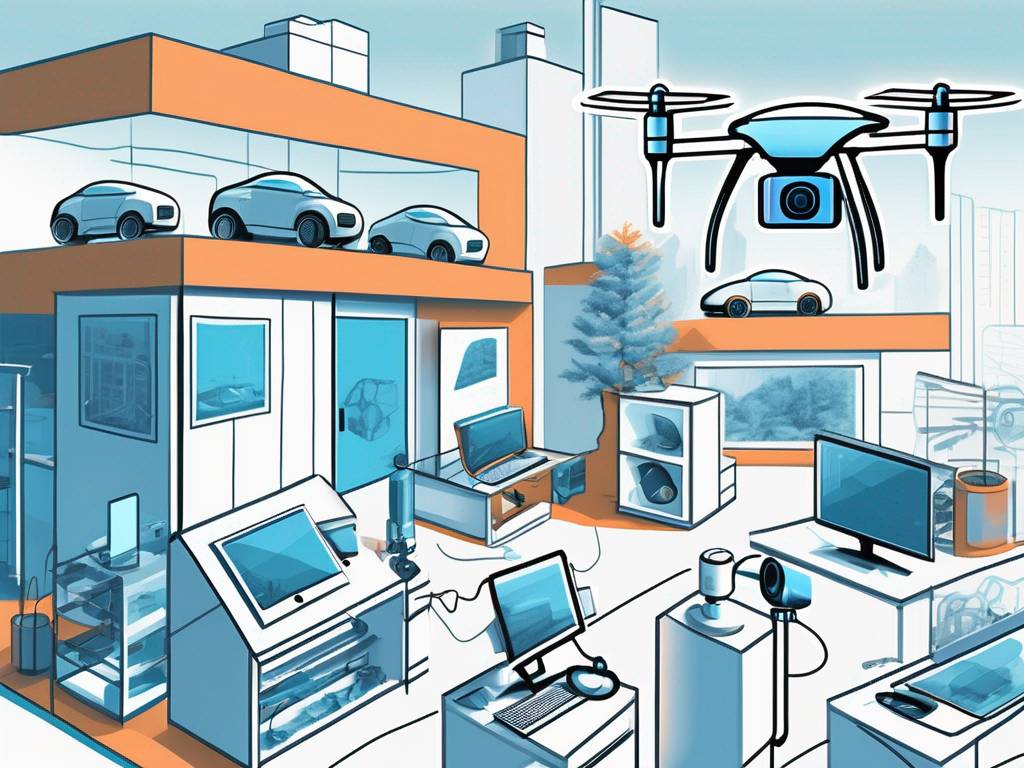The Impact of AI in Travel: Revolutionizing the Way We Explore
Key Insights
AI is transforming the travel industry by enhancing travel planning, improving the travel experience, and predicting future travel trends
C-level executives need to embrace AI technology in order to stay competitive and provide personalized and efficient services to travelers
While AI offers numerous benefits, it also poses potential risks and challenges that need to be addressed and managed effectively
AI has the potential to revolutionize the way we explore, making travel more accessible, convenient, and enjoyable for travelers worldwide
Understanding the Role of AI in Travel
Artificial Intelligence (AI) has emerged as a game-changer in the travel industry, transforming the way we plan, experience, and navigate our travels. What was once limited to science fiction has now become a reality, with AI revolutionizing various aspects of the travel sector. From voice assistants providing personalized travel recommendations and seamless booking experiences to enhanced navigation and language translation, AI in travel is paving the way for a new era of travel exploration.
Imagine this: you’re planning a trip to a foreign country, and you have no idea where to start. With AI, you can now receive personalized travel recommendations based on your interests, budget, and previous travel experiences. These recommendations take into account factors such as local events, weather conditions, flight forecasting, and popular attractions, ensuring that your travel itinerary is tailored to your preferences. AI aids in the customer journey by providing everything a customer needs.
But AI doesn’t stop at just planning your trip. It also enhances your travel experience. Imagine arriving at a bustling airport, unsure of where to go. AI-powered navigation systems can guide you through the airport, providing real-time updates on gate changes, security wait times, and even suggesting nearby amenities like restaurants or lounges.
The Intersection of AI & Travel
As AI continues to evolve, its role in the travel industry will become increasingly vital. The intersection of AI and travel opens up a plethora of opportunities for C-level executives in the travel and tourism industry. By harnessing the power of AI, travel companies can now analyze vast amounts of data to gain valuable insights about customers’ preferences, predict customer behavior, and travel patterns. This enables them to offer tailored, recommendations and experiences to individual travelers.
AI can also help streamline the booking process. With AI-powered online customer service representatives, travelers can receive instant responses to their queries, making the booking experience more efficient and user-friendly. AI assistants can provide personalized advice for every customer experience in multiple languages, ensuring that language barriers are no longer an obstacle when it comes to planning and booking your dream vacation. This will ultimately improve customer satisfaction rates.
The Evolution of AI in the Travel Industry
AI has come a long way in the travel industry, from basic chatbots and virtual assistants to sophisticated algorithms that can make predictions and decisions in real-time. Today, AI-powered systems can use machine learning to analyze massive amounts of data, such as weather patterns, pricing trends, and user preferences, to optimize travel planning and provide accurate recommendations. This evolution has empowered travelers with convenient, efficient, and customized travel experiences that typically require human intelligence.
For example, AI can analyze historical flight data to predict delays or cancellations, allowing travelers to make alternative arrangements in advance. It can also monitor social media platforms for any travel-related updates or disruptions, providing real-time alerts to travelers. This level of proactive assistance ensures that travelers are always one step ahead, minimizing stress and maximizing enjoyment during their journeys.
As AI continues to advance, we can expect even more exciting developments in the travel industry. From AI-powered virtual reality experiences that allow you to explore destinations before you even book your trip to AI-guided tours that provide immersive and informative experiences, the possibilities are endless. The future of travel is undoubtedly intertwined with the power of AI and travel companies embracing this technology are ahead of the game.
How AI is Changing Travel Planning
AI has revolutionized the way travelers plan their journeys. Through advanced algorithms and machine learning, AI can analyze vast amounts of data and provide personalized travel recommendations that suit individual preferences and requirements based on customer data.
But what exactly does this mean for travelers? Let’s dive deeper into how AI is transforming the travel planning experience through new technologies.
AI & Personalized Travel Recommendations
Gone are the days of generic travel itineraries. With AI, travel companies can now offer recommendations based on travelers’ preferences, previous travel history, and even social media interactions. By analyzing these data points, AI-powered systems can suggest destinations, activities, and accommodations that align with the traveler’s interests and sentiment analysis, thus enhancing the overall planning process.
Imagine being able to receive tailored travel suggestions that take into account your specific interests and desires. Whether you’re a foodie looking for the best local restaurants, an adventure seeker in search of thrilling activities, or a history buff interested in cultural landmarks, AI can curate a travel experience that caters to your unique preferences.
AI can also consider practical factors such as budget, travel dates, and transportation options. By incorporating these variables into its recommendations, AI ensures that travelers receive a comprehensive and personalized travel plan that meets their needs.
AI in Flight & Hotel Booking
AI is not only transforming the planning stage but also streamlining the flight and hotel booking process. Through AI-powered chatbots, travelers can now access real-time flight information, compare prices, and make bookings directly within messaging apps or websites. AI systems can also assist people in booking the cheapest flights.
Imagine having a virtual travel assistant at your fingertips, ready to assist you with all your booking needs. AI-powered chatbots can provide instant responses to queries, helping travelers find the best flight deals, check seat availability, and even make hotel room reservations. This eliminates the need for multiple searches across different platforms, saving time and effort on making travel bookings.
Additionally, AI algorithms can analyze pricing trends, availability, and user reviews to recommend the best accommodations that fit the traveler’s budget and preferences. By taking into account factors such as location, amenities, and customer ratings, AI can ensure that travelers find the perfect hotel that meets their expectations.
AI can also assist in managing changes and disruptions in travel plans. In the event of flight delays or cancellations, AI-powered systems can automatically rebook flights or suggest alternative routes, minimizing the inconvenience for travelers.
AI is revolutionizing travel planning by providing personalized recommendations and streamlining the booking process. With AI, travelers can expect a more tailored and efficient travel experience, allowing them to make the most of their journeys.
AI in Enhancing Travel Experience
AI goes beyond travel planning; it is also enhancing the travel experience itself. From navigation assistance to language translation, AI-powered technologies are transforming how travelers explore and interact with their environment.
AI in Navigation & Local Exploration
Lost in an unfamiliar city? AI-powered navigation systems can guide travelers through the labyrinth of streets and alleys, taking into account real-time traffic, public transportation options, and even local events. These systems use pattern recognition to recommend the best routes, attractions, hidden gems, and dining options, ensuring that travelers make the most of their time in a given destination.
AI & Language Translation for Travelers
Language barriers are no longer a significant obstacle for travelers, thanks to AI. Sophisticated language translation tools powered by AI algorithms can instantly translate signs, menus, and conversations, making communication easier and more seamless. Travelers can confidently immerse themselves in local cultures, interact with locals, and navigate through foreign lands with greater ease.
The Future of AI in Travel
The potential of AI in the travel industry is limitless, and its future holds exciting possibilities. By leveraging AI technologies, travel companies can shape future travel trends and respond to travelers’ evolving needs in innovative ways.
Predicting Travel Trends With AI
Predictive modeling allows AI to analyze vast amounts of data to not only provide personalized recommendations, but also predict future travel trends. C-level executives can utilize AI algorithms to identify emerging destinations, anticipate customer preferences, and develop tailored products and services to cater to these trends. By staying ahead of the curve, companies can position themselves as industry leaders and gain a competitive edge.
The Potential Risks & Challenges of AI in Travel
While AI brings tremendous benefits to the travel industry, it also presents its fair share of risks and challenges. C-level executives must be aware of potential privacy concerns, data security issues, and ethical dilemmas associated with the use of AI in travel. They need to proactively address these concerns and implement stringent measures to protect customer data and ensure responsible AI usage.
The impact of AI in travel is nothing short of revolutionary. By harnessing the power of AI, travel companies can offer personalized travel recommendations, streamline the planning process, enhance the travel experience, book flights and hotels, and predict future travel trends more accurately. For C-level executives in the industry, embracing AI technology is crucial to staying competitive, providing top-notch services to travelers, and increasing operational efficiency. However, as with any disruptive technology, it is essential to address potential risks and challenges effectively to build trust and ensure long-term success. With AI leading the way, the future of travel exploration looks brighter than ever.
Questions?
-
What are some practical applications of AI in the travel sector?Toggle questionAI applications in travel include chatbots for customer support, personalized recommendations, augmented reality, demand forecasting, route optimization, and efficient resource management.
-
How is AI transforming the travel industry?Toggle questionAI is revolutionizing the travel industry and business world by automating processes, enhancing personalization, and improving overall efficiency. From chatbots to predictive analytics, AI is streamlining operations and enhancing customer experiences in creative ways.
-
How does AI assist in travel planning and booking?Toggle questionAI aids in travel planning by analyzing user preferences, suggesting personalized itineraries, and providing real-time recommendations. It optimizes booking processes through historical data, fraud detection, and personalized promotions.
-
What role does AI play in post-pandemic travel recovery?Toggle questionAI contributes to post-pandemic. travel recovery by enabling touchless experiences, ensuring health and safety compliance, and predicting travel trends. It also assists in adapting to changing conditions and optimizing operations for a resilient travel industry.
-
What challenges might the travel industry face in adopting AI?Toggle questionChallenges include high implementation costs, resistance to change, data privacy concerns, and the need for skilled workforce. Overcoming these obstacles and taking advantage of these tools is crucial for successful AI integration in the travel sector.
-
Are there privacy concerns associated with AI in travel?Toggle questionYes, privacy concerns exist due to the collection and analysis of sensitive traveler data. Striking a balance between personalization and protecting privacy is a challenge that the industry must address to gain trust.
-
Is AI being used to make travel more sustainable?Toggle questionYes, AI contributes to sustainability by optimizing routes for fuel efficiency in many forms, managing resources, and promoting eco-friendly travel options while also providing the best prices. It aids in reducing the environmental impact of the travel industry.
-
How does AI contribute to travel safety and security?Toggle questionAI enhances safety and security through facial recognition, predictive analytics for potential threats, and monitoring of real-time data. It assists in identifying risks and ensuring a secure travel environment.
-
Can AI be used to improve customer service in the travel industry?Toggle questionAbsolutely, AI improves customer service by offering instant assistance through chatbots, providing personalized recommendations, relevant offers and resolving issues efficiently. It enhances overall customer satisfaction and loyalty.

 hello@westlink.com
hello@westlink.com  (866) 954-6533
(866) 954-6533  700 N Colorado Blvd,
700 N Colorado Blvd,






Comments